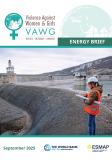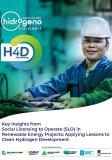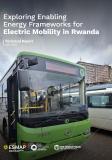Publications
The Clean Cooking Alliance (CCA) has been active in Bangladesh since 2012. In 2013, they convened stakeholder consultations to develop and launch the Bangladesh Country Action Plan for Clean Cookstoves (CAP) led by the Power Division of the government’s Ministry of Power, Energy and Mineral Resources. In May 2018, the government held a CAP review workshop to ensure the realignment of CAP 2013 with the new changes and developments in Bangladesh. As a result, a renewed CAP, the National Action Plan for Clean Cooking (2020–2030) was launched with the goal of achieving hundred percent clean-cooking adoption throughout Bangladesh by 2030.
This assessment brings together learning from recent studies and experiences and expects to help CCA and the World Bank look at prospective strategies with a focus of access to finance and incentive options for scaling up clean cooking in Bangladesh.
In chapters 1 and 2, the report first reviews the current state of the clean-cooking market in Bangladesh, covering a variety of fuels and technologies based on the significance of market penetration in Bangladeshi households, including natural gas, LPG and Improved Cookstoves (ICSs). Other solutions discussed in the report include electric/induction stoves, solar cookers, and biogas. Chapter 3 discusses the stakeholders who played important roles in moving the 2013 Country Action Plan forward, the consumer segmentation, and the prevailing culture of stove stacking within the segments. The subsequent chapters (chapters 4–6) then explore strategies and business models in which ICSs can be distributed across the country following a market-based approach through Infrastructure Development Company Limited (IDCOL’s) ICS program, with a focused discussion on access to finance and community engagement. Finally, chapter 7 puts forward specific recommendations to address ways in which the IDCOL ICS program can be improved and optimized.
Bhattacharjee,Tanuja; Bairiganjan,Sreyamsa.2021.
Understanding Market-Based Solutions and Access to Finance Options for Clean-Cooking Technologies in Bangladesh (English). Energy Sector Management Assistance Program (ESMAP) Washington, D.C. : World Bank Group. http://documents.worldbank.org/curated/en/311561624871430872/Understanding-Market-Based-Solutions-and-Access-to-Finance-Options-for-Clean-Cooking-Technologies-in-Bangladesh



